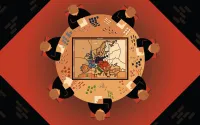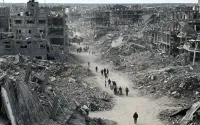Under the headline, "A War We Just Might Win," The New York Times on Monday published an op-ed by Michael O'Hanlon of the Brookings Institution and Kenneth Pollack, both referred to as critics of the way the Bush Administration has "handled" the war in Iraq. (Pollack had, in fact, been a major cheerleader for the Bush administration's invasion in 2003.) After eight days in Iraq "meeting with American and Iraqi military and civilian personnel," the two claimed "the debate in Washington was surreal," and that "[w]e are finally getting somewhere in Iraq, at least in military terms."
The President's surge plan, as carried out by General David Petraeus, was, they added, working. Their carefully cobbled together formula for where it might take American forces went like this: It had "the potential to produce not necessarily 'victory' but a sustainable stability that both we and the Iraqis could live with." They concluded: "[T]here is enough good happening on the battlefields of Iraq today that Congress should plan on sustaining the effort at least into 2008." Of course, O'Hanlon's and Pollack's ideas about what "Iraqis could live with" and Iraqi ideas on the subject may turn out to differ somewhat.
Be that as it may, the Bush Administration - even though characterized in the piece as having "lost essentially all credibility" - was desperate enough to treat the event as a glowing ray of sunlight in the gloom of night. According to Martha Raddatz of ABC News, "The White House was thrilled with the op-ed piece because it concentrated on military progress and didn't say very much about the lack of political progress. This is what the President has been trying to push. The White House sent this op-ed piece out to the press corps, anybody that would read it today. They are hoping this buys them more time on the Hill for the surge to continue, but they've been hoping that for a long time."
On that very day, the Iraqi Parliament adjourned for a more than month-long vacation without having passed a single major "benchmark" urged on its legislators by either the Bush Administration or Congress ("'We do not have anything to discuss in the parliament, no laws or constitutional amendments, nothing from the government. Differences between the political factions have delayed the laws,' Kurdish lawmaker Mahmoud Othman told Reuters."); the major Sunni faction in Prime Minister Nuri al-Maliki's government was threatening to withdraw; and the Prime Minister himself was reportedly under challenge and in some danger of being ousted by members of his own party.
And that was just the accompanying political news. On the day of the O'Hanlon/Pollack op-ed, a summary report on the humanitarian situation in Iraq by the international aid group Oxfam and about eighty other aid agencies, gave the concept of "sustainable stability" some grim meaning. In fact, the report - which the Administration did not rush to pass out to a single reporter - added up to a functional definition of Iraq as a land in a state of unsustainable instability, a "nation" in which an estimated 1 million families are now headed by widows. From child malnutrition to "absolute poverty," large-scale unemployment to an almost blanket lack of effective sanitation, the Iraqis O'Hanlon and Pollack didn't meet with are in a hell on Earth. The Oxfam report estimates that almost one-third of the Iraqi population is "in need of emergency aid."
In fact, while Pollack and O'Hanlon met with the "known knowns" in the equivalent of Green Zone Iraq, a brave French reporter, Anne Nivat, spent two weeks living as an Iraqi in a Shiite neighborhood in "Red Zone" Baghdad. ("Only my contacts knew that I was a foreigner and a reporter.") She even went from Red Zone to Green Zone Iraq once to - like Pollack and O'Hanlon - have a meeting with General Petraeus. ("He met me in full combat gear. Between the first checkpoint and the parking lot of the U.S. Embassy, still based in Saddam Hussein's Republican Palace, a distance of about a mile, I was checked six times. I had come from the "red zone.")
From Nivat, you get a very different picture of "sustainable" Iraq, a place, it turns out, where you're lucky to get one or two hours of electricity delivered a day, while the temperatures soar to 130 degrees. Those with small generators that can make electricity are "the most powerful people in every district." In one of the more upbeat aspects of her tale, Nivat describes the rise of a new job category, a "new breed of real-estate agents." They broker house or apartment exchanges between Sunnis and Shiites being ethnically cleansed from their present neighborhoods. The parties agree to exchange abodes "until the situation improves." The Shiite man, who took Nivat around for her two weeks in Baghdad, in one of the more devastating quotes to come out of the capital in recent times, told her: "My uncles and cousins were murdered by Saddam's regime. I wanted desperately to get rid of him. But today, if Saddam's feet appeared in front of me, I would fall to my knees and kiss them!"
In the meantime, of course, the Bush Administration - with a helping hand from O'Hanlon and Pollack - continues along a path guaranteed not to create a newly sustainable Iraq, but to prolong Iraq's unsustainable instability for endless months, or years, or even decades to come. General Petraeus is now publicly talking about "a large contingent of [US] troops in Iraq until the middle of 2009" with no end to the American occupation in sight. For all of them, from the President down to the pundits, the thing that must be - and can't be - sustained is what, in the Vietnam period, was known as "American credibility" and now might be thought of as an American position of dominance in the Iraqi heartland of the energy heartlands of the planet. This is a terrible imperial farce in support of a "surge" plan that, as sociologist Michael Schwartz explains in "The Benchmarks That Matter," has already surged in directions too predictable and horrible for sustenance.






